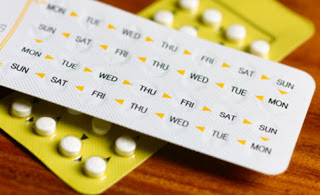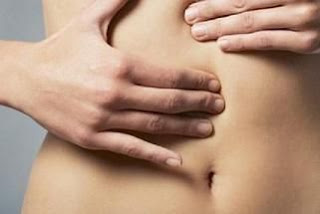Did birth control cause my ovarian cyst — and how can I prevent more?
There have been four times in my life that I have experienced pain so excruciating that I thought I could not physically handle it. Two times I was in labor with little girls; the other two times followed a rupture of a large ovarian cyst that I was unaware even existed.
My first ovarian cyst ruptured in 2003 when I was a college student. It was such a severe, large rupture that my ovary actually needed to be cauterized and “saved” through laproscopic surgery. I had been receiving injections every three months of Depo-Provera, a progestin birth control option, for nearly three years. Part of the way the shot works is by making the cervical mucus thicker, preventing eggs from reaching a fertilization spot.
This also meant that for most of those three years, I did not have a regular period. At the time of the rupture, I had not had a period in over a year. My surgeon told me that while Depo-Provera had NOT caused the cyst or rupture, not having a period may have led to the cyst growing so large because I lacked a monthly cleanse. Needless to say, I stopped getting Depo-Provera injections. I made the switch to a normal birth control pill — one that I went off when I no longer had health insurance and was living life as a freelance new writer, waitress and nanny. My first daughter was conceived during that time period. When she was about nine months old, I opted for the NuvaRing and used it with success until a few months prior to conception of my second daughter.
Six weeks after my youngest was born, I was prescribed the “mini pill” by my OB. My husband and I were not ready for any permanent birth control options, and because I was breastfeeding, I could not use my beloved NuvaRing. I was told I could also get the Depo Provera shot — but I quickly declined it. I admit that I did not research the way the birth control worked, but simply accepted it as the right thing in my exhausted, and desperately-not-wanting-to-get-pregnant-ever-again-in-this-lifetime, state. I did not realize that the mini pill is a cousin of Depo-Provera and works in a similar way.
About eight months after starting the mini pill (three weeks ago), I landed in the Emergency Room with a ruptured ovarian cyst, almost ten years after my first. After over two months of no period, some lower back cramping and severe constipation, the cause of my irregularities and discomfort finally burst. I was angry at myself for not noticing the signs earlier, but they were so easily attributed to other things.
No period = breastfeeding a baby with a healthy appetite. Lower back cramping = losing weight and body still adjusting to life postpartum. Constipation = Oh, I don’t know, take your pick: not eating on a schedule, not getting enough water, stress, holding it instead of going when my house was about to be destroyed by four crazy children, etc.
I was quick to blame my birth control method, especially since it uses the same method as the shot that landed me in surgery back in my college days. After doing a little more research, however, I figured out that ovulation is the problem. Really convenient, I know. Both of my cysts that landed me in the hospital were diagnosed as follicular cysts, which simply means something goes wrong when the egg bursts from the Fallopian tube and it turns into a nasty cyst instead.
Did Birth Control Cause My Ovarian Cyst – The Facts
Follicular cysts are actually incredibly common, but the majority pass without any knowledge on the part of the woman. The ones that stick around longer than a menstrual cycle or two grow and fill with cystic fluid. When they burst, they can be as large as a grapefruit and send a grapefruit-sized amount of fluid coursing into the abdominal cavity.
The initial pain of the rupture is intense, but the excess fluid can cause a host of other problems like chest pain that rivals the worst indigestion you’ve ever had paired with some wicked, pregnancy-like heartburn. I cried for several days because the pain in my chest and shoulders was so intense every time I nursed my nine-month-old. You also have to watch for infection of the fluid, which of course is tough to monitor until you actually HAVE the infection.
Did birth control cause my ovarian cyst? Though ovulation is to blame, I do believe both methods of birth control did elevate the problem by interfering with the natural process of ovulation and menstruation in my body. I think this led to the large size and severity of my cysts both times. I would like to stress that this is NOT a medical opinion and my own doctor even said it was merely a “coincidence.” Still, I have discontinued the use of the mini pill and we are using other temporary methods for birth control until I figure out a better solution.
While I was writhing in pain the night my cyst burst, and in the days of my recovery, I scoured the Web for other women going through the same thing. I found a surprisingly small amount of information — or the information that I did find was missing some key information. So I decided I’d share my story and answer a few key questions in case other women are online looking for answers too. Did birth control cause my ovarian cyst? Well, let’s take a closer look.
Symptoms of Ovarian Cysts
Irregular Menstrual Cycle
Bloating or heaviness in abdomen
Constipation
Pressure during urination or difficultly fully emptying bladder
Nausea, breast tenderness, vomiting
Dull ache in pelvic region
Pressure on bowels or pain during bowel movements
Pelvic pain during or following intercourse
Types of Ovarian Cysts
Follicular, or functional: These cysts are very common and form when an egg released during ovulation develops into a cyst.
Polycystic, or PCOS: Women with PCOS have follicles with eggs that do not fully mature, causing cysts to form.
Endometriomas: This painful cystic condition happens when uterus tissue grows in other areas of the body, including the ovaries. Fertility is often affected by endometriosis.
Dermoid: These cysts form with tissue that resembles other tissue in the body, including teeth, hair and skin.
Cystadenomas: These fluid-filled cysts form directly on the ovary, without an egg.
There is a difference between an ovarian cyst and an ovarian tumor. The tumor type is more serious and will need to be removed to determine if it is cancerous. All of these distinctions may help you determine the answer to the questions: did birth control cause my ovarian cyst?
Treatment for Ovarian Cysts
As I said above, many ovarian cysts come and go without causing too much trouble. Even ones that rupture really do not need treatment, but can lead to a lot of pain. You want to head to the doctor or emergency room if you feel sharp, sudden abdominal pain or pelvic pain that comes with or without a fever or vomiting. Both times my cysts ruptured I experienced symptoms similar to shock — clammy skin, uncontrollable shaking, lightheadedness and extreme fatigue. In fact, there was not much at the Emergency Room that the doctor could do for me other than give me a strong anti-inflammatory drug in an IV before releasing me.
In some cases when a cyst is discovered, surgery is recommended — especially in the case of a large cyst that may be cancerous (this is rare!). The best prevention for future cysts is birth control pills that prevent ovulation completely, which sort of goes against the whole “did birth control cause my ovarian cyst?” argument.
How Do I Know if my Ovarian Cyst Ruptured?
The pain that accompanies a ruptured ovarian cyst varies. You may notice some pelvic cramping and abdominal pain that is tolerable and goes away in a few days, or (as a good friend who has been through this puts it) you may feel like you “are dying.” A doctor will not be able to tell you if a cyst has ruptured without an ultrasound, and even then, it can be tough to tell if that is the culprit. If you are really not sure what is happening and there is severe abdominal pain involved, call your OB or head straight to the ER.
So… Did birth control cause my ovarian cyst?
Officially, no. In my case, I think that progestin birth control options aggravated the state of my follicular cysts to the point of painful rupture. Two times is enough for me personally, but your situation may be totally different. Types of birth control that prevent ovulation (estrogen-based types) actually decrease the risk of developing ovarian cysts and some studies show birth control can reduce risk for ovarian cancer. If you are breastfeeding, however, you may not have the estrogen option. The mini pill or birth control shot may be right for you, or you may want to look into having an IUD implanted until you are ready for more children or to go back to another form of birth control.
If you are reading this because you think you have a cyst that ruptured, boy do I feel your pain! I hope that you can find a way to cope with your cysts, no matter what the cause, and still be able to have children if you desire, breastfeed if it your choice and avoid landing in the emergency room.
Did birth control cause my ovarian cyst? I may never really know but I’ll certainly be hyper-aware of the symptoms in the future.
I’d love to hear your story if you’ve dealt with ovarian cysts. Please share it below in the comment section, or send me an email to mumblingmommy@mumblingmommy.com.
Let’s connect on social media:
Mumbling Mommy on Facebook
Mumbling Mommy on Instagram
Mumbling Mommy on Pinterest
Mumbling Mommy on Twitter
Category: HealthTags: Depo-Provera










